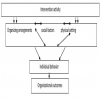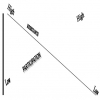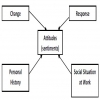Home | ARTS | Management Concepts & Organisational Behaviour
|
Definitions and Characteristics of OD
Management Concepts & Organisational Behaviour - Organisational Development (OD)
Definitions and Characteristics of OD
Posted On :
Keith Davis defines OD “as an integrated strategy that uses group process to focus on the whole culture of organization in order to bring about planned change.
Definitions on OD:
Keith Davis defines OD “as an integrated strategy that uses group process to focus on the whole culture of organization in order to bring about planned change. It seeks to change beliefs, attitudes, values, structures, and practices so that the organization can better adapt to technology and live the fast pace of change”.
According to Fred Luthans, OD represents “an applied, macro-level approach to planned change and development of complex organizations”.
Characteristics of OD:
OD characteristics are implied in its definitions. They differ substantially from
those of a typical training program which are summarized in the following
lines.
Focus on the whole organization: in OD attempts are made to develop the whole organization so that it can be responding to changes effectively. In contrast, traditional training programs tend to focus quite narrowly on specific jobs or small work groups.
Systems organization: OD is concerned with structure, process as well as attitudes. It lays emphasis on how parts relate, not on the parts themselves.
Problem solving: OD seeks to solve problems rather than to discuss theoretically. This focus on real ongoing problems, not artificial ones, is called action research. This characteristic of OD is so important that OD is sometimes defined as “organizational improvement through action research.”
Experiential learning: OD offers experiential learning which means participants learn by experiencing in the training environment the kind of human problems they actually face on the job.
Contingency orientation: OD is said to be situational or contingency-oriented. Unlike traditional training approaches which emphasize one best way to solve the problems, OD is flexible and pragmatic, adapting actions to fit particular needs.
Team building: OD’s general role is to build better team work throughout the organization. OD attempts to integrate four elements- people, structure, technology and environment.
Feed back: OD relies on data feedback to participants who made decisions using it
Focus on the whole organization: in OD attempts are made to develop the whole organization so that it can be responding to changes effectively. In contrast, traditional training programs tend to focus quite narrowly on specific jobs or small work groups.
Systems organization: OD is concerned with structure, process as well as attitudes. It lays emphasis on how parts relate, not on the parts themselves.
Problem solving: OD seeks to solve problems rather than to discuss theoretically. This focus on real ongoing problems, not artificial ones, is called action research. This characteristic of OD is so important that OD is sometimes defined as “organizational improvement through action research.”
Experiential learning: OD offers experiential learning which means participants learn by experiencing in the training environment the kind of human problems they actually face on the job.
Contingency orientation: OD is said to be situational or contingency-oriented. Unlike traditional training approaches which emphasize one best way to solve the problems, OD is flexible and pragmatic, adapting actions to fit particular needs.
Team building: OD’s general role is to build better team work throughout the organization. OD attempts to integrate four elements- people, structure, technology and environment.
Feed back: OD relies on data feedback to participants who made decisions using it
Tags : Management Concepts & Organisational Behaviour - Organisational Development (OD)
Last 30 days 2222 views















